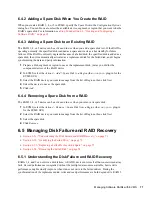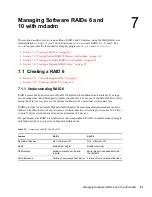
Managing Software RAIDs with EVMS
79
no
vd
ocx
(e
n)
6 Ap
ril 20
07
UUID=1c661ae4:818165c3:3f7a4661:af475fda
devices=/dev/sdb3,/dev/sdc3
MAILADDR yourname@example.com
The MAILADDR line gives an e-mail address that alerts should be sent to when mdadm is
running in
--monitor
mode with the
--scan
option. There should be only one
MAILADDR line in
mdadm.conf
, and it should have only one address.
3
Start
mdadm
monitoring by entering the following at the terminal console prompt:
mdadm --monitor --mail=
yourname@example.com
--delay=
1800
/dev/md0
The
--monitor
option causes
mdadm
to periodically poll a number of
md
arrays and to
report on any events noticed.
mdadm
never exits once it decides that there are arrays to be
checked, so it should normally be run in the background.
In addition to reporting events in this mode,
mdadm
might move a spare drive from one array
to another if they are in the same spare-group and if the destination array has a failed drive but
no spares.
Listing the devices to monitor is optional. If any devices are listed on the command line,
mdadm
monitors only those devices. Otherwise, all arrays listed in the configuration file are
monitored. Further, if
--scan
option is added in the command, then any other
md
devices that
appear in
/proc/mdstat
are also monitored.
For more information about using
mdadm
, see the
mdadm(8)
and
mdadm.conf(5)
man
pages.
4
To configure the
/etc/init.d/mdadmd
service as a script:
suse:~ # egrep 'MAIL|RAIDDEVICE' /etc/sysconfig/mdadm
MDADM_MAIL="yourname@example.com"
MDADM_RAIDDEVICES="/dev/md0"
MDADM_SEND_MAIL_ON_START=no
suse:~ # chkconfig mdadmd --list
mdadmd 0:off 1:off 2:off 3:on 4:off 5:on 6:off
6.7 Deleting a Software RAID and Its Data
If you want to remove the prior multipath settings, deactivate the RAID, delete the data on the
RAID, and release all resources used by the RAID, do the following:
1
If you want to keep the data stored on the software RAID device, make sure to back up the data
to alternate media, using your normal backup procedures. Make sure the backup is good before
proceeding.
2
Open a terminal console prompt as the
root
user or equivalent. Use this console to enter the
commands described in the remaining steps.
3
Dismount the software RAID device by entering
umount <raid-device>
4
Stop the RAID device and its component devices by entering
mdadm --stop <raid-device>
mdadm --stop <member-devices>
For more information about using
mdadm
, please see the
mdadm(8)
man page.
5
Delete all data on the disk by literally overwriting the entire device with zeroes. Enter
mdadm --misc --zero-superblock <member-devices>
Summary of Contents for LINUX ENTERPRISE SERVER 10 - STORAGE ADMINISTRATION GUIDE 7-2007
Page 4: ...novdocx en 6 April 2007...
Page 30: ...30 SLES 10 Storage Administration Guide novdocx en 6 April 2007...
Page 42: ...42 SLES 10 Storage Administration Guide novdocx en 6 April 2007...
Page 58: ...58 SLES 10 Storage Administration Guide novdocx en 6 April 2007...
Page 90: ...90 SLES 10 Storage Administration Guide novdocx en 6 April 2007...
Page 100: ...100 SLES 10 Storage Administration Guide novdocx en 6 April 2007...
Page 106: ...106 SLES 10 Storage Administration Guide novdocx en 6 April 2007...
















































